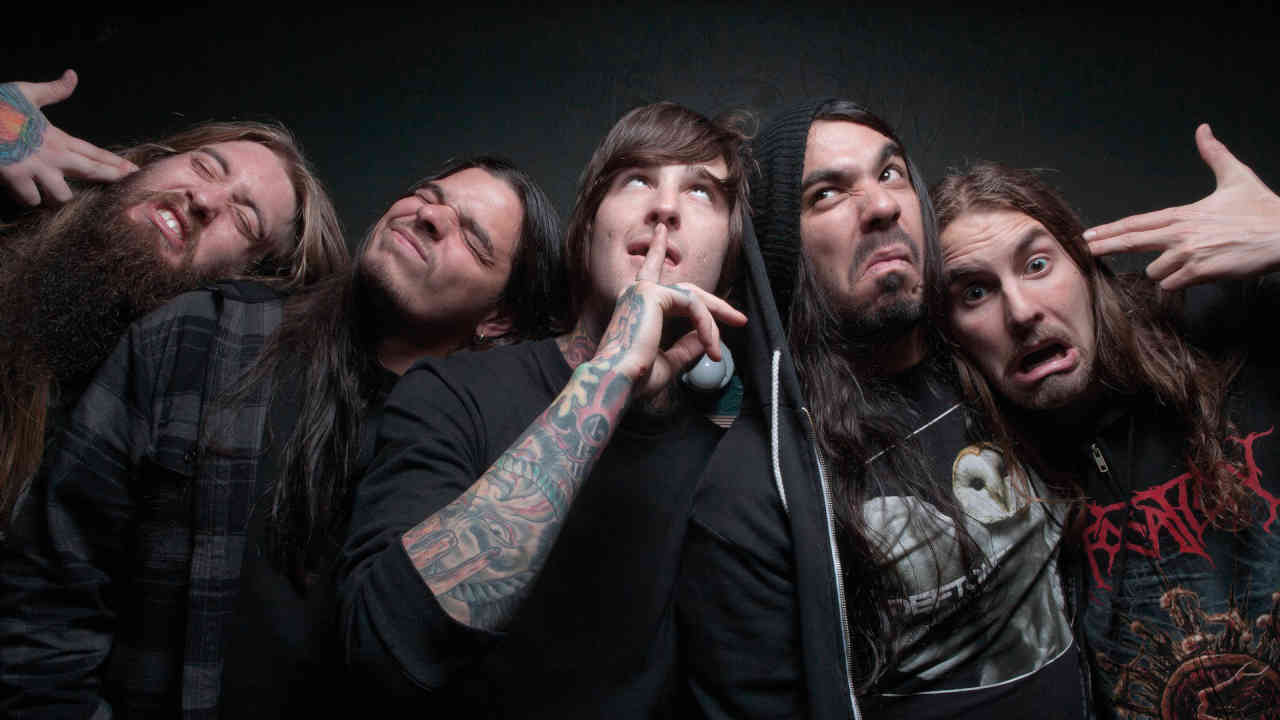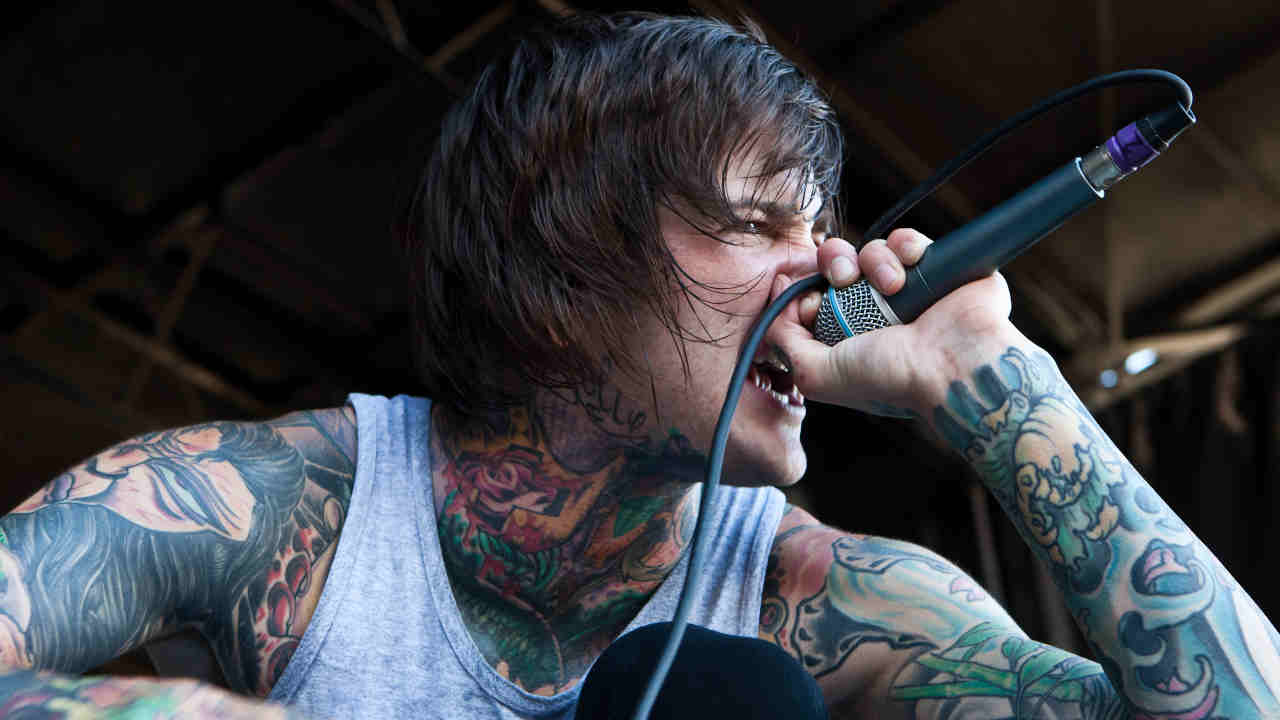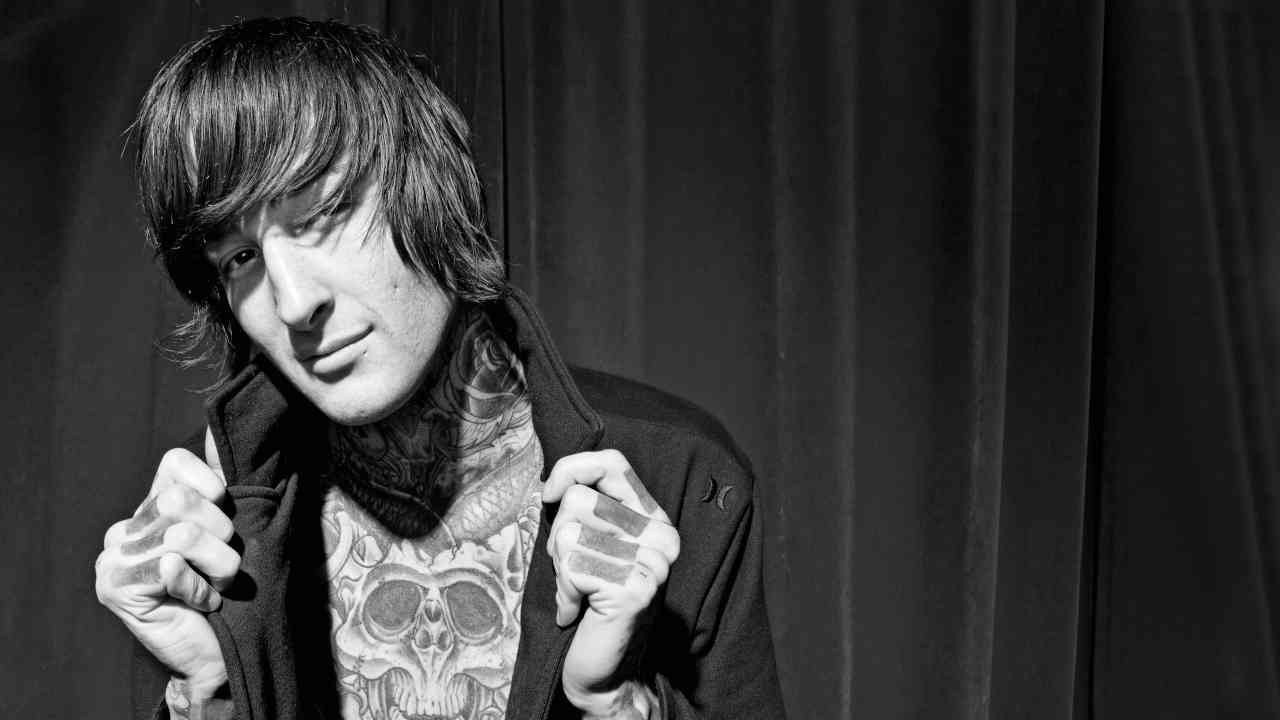Suicide Silence guitarist Chris Garza was in high school in Riverside, California when he heard about Mitch Lucker. Here was this tattooed kid from a neighbouring town, a year older than Chris, who fronted a band called Dying Dreams alongside his guitarist brother Cliff. Word of this Mitch guy’s talent and presence had spread, bypassing even the usually insurmountable barriers of intra-school rivalry.
“People at my school were talking about him, even then,” says Chris now. “He had it right out of the gate. I’d listen to the Dying Dreams demo, and that voice – that high scream he became known for – has been ingrained in my mind ever since.”
Fellow Suicide Silence guitarist Mark Heylmun has an equally vivid memory, of seeing Mitch Lucker for the first time. It was at a Suicide Silence gig at the Showcase Theatre in their hometown of Corona, California. Chris Garza had co-founded the band in 2002 and Mitch had joined the following year. That night they were bottom of a multi-band bill headlined by 00s metal footsoldiers God Forbid.
“When Suicide Silence come on, I just had to stop and watch,” says Mark. “Mitch had the ‘it’ factor – this guy was so fucking commanding. I saw him in the pit afterwards. He was walking in circles with his arms all wide. I was, like, ‘Dude, that guy’s fucking awesome.’”
By 2005, Mark had joined Suicide Silence himself, shortly after the release of their self-titled debut EP. The band began to carve a name out for themselves beyond the confines of Southern California’s Inland Empire. Their rise was accelerated by 2007’s debut album, The Cleansing, a key staging post in the emerging deathcore scene. It was followed by two more albums, 2009’s No Time To Bleed and 2011’s The Black Crown, each more accomplished and ambitious than the last. It all pointed to a blazing future for Suicide Silence and their charismatic frontman.
That future would never materialise for Mitch Lucker. On the morning of November 1, 2012, the singer died after crashing his motorbike late the previous night. He was just 28 years old. Modern metal had lost one of its brightest stars.
The influence Mitch had on deathcore with Suicide Silence could be felt even before his passing. His gut-level roars and piercing screams became the benchmark against which deathcore singers were measured, while his physical presence was unmatched: a skinny, six-foot-two blur of limbs and ink, headbanging with his arms spread as wide as an eagle.
“That guy was a performer, body and soul,” says Will Ramos, singer with modern deathcore hotshots Lorna Shore, who fell in love with Suicide Silence in his mid-teens. “He wrote crazy shit, he sounded insane, his whole look was awesome. When I was growing up, I was, like, ‘I want to be that guy.’”

The second track on The Black Crown, the final album that Mitch Lucker made with Suicide Silence, is titled O.C.D. Its claustrophobic lyrics paint a picture of a mind trapped by its own neuroses. ‘Is this the end of my reality?’ roars Mitch. ‘I’ll hold my breath ’til I can’t breathe.’
Those lyrics were autobiographical. The singer had been diagnosed with Obsessive Compulsive Disorder as a child. “He was a clean freak,” says Mark Heylmun. “He would sit and pick at his scabs. He’d find little things to pick at on his body. Like, ‘What are you even grabbing at? There’s nothing on you.’ He had germaphobe tendencies, too – he did not like being hugged by drunk fans.”
It was Mitch’s OCD that indirectly led him to becoming a singer. He found both solace and release from the condition in the albums his dad, Kip, bought for him and his older brother, Cliff: Sepultura, Deftones, Korn. When Cliff began jamming metal and hardcore songs on the guitar, he asked his 16-year-old sibling to sing along. Within a few months, the pair had formed the band that would become Dying Dreams. Mitch started hanging around The Showcase Theatre, the hub for metal and punk bands passing through their hometown of Corona, California.
It was at the Showcase that he met Chris Garza. Even looking back today, Chris isn’t sure how Mitch went from being the lanky kid that Suicide Silence’s original singer, Tanner Womack, invited to perform at a show with them to becoming their sole frontman. “He just kind of worked his way in,” recalls Chris with a smile. “He knew before me: ‘This is my band now.’”
Mitch was straight edge back then. Mark says the singer didn’t have his first drink until his 21st birthday in October 2005, a few weeks after the guitarist joined the band. But Mitch was a loose cannon even before he began partying. He and his friends would club together to buy old cars for $500 a pop, only to drive them around and deliberately trash them (in an eerie foreshadowing of what was to come, one smash-up left Mitch with a punctured lung).
“He was mad,” says Chris. “Before we got signed, when we were playing to five people, we’d stay at people’s houses on tour and he’d end up putting fireworks up his ass and lighting them. Most of the time, if he went out, I’d stay at home. There’s no way I’m going out to throw golf balls at a freeway.”
Despite his wild streak, Mitch was focused on the job in hand, which was to ensure he and his band were as good as they could possibly be. Mark remembers the first time he played with Suicide Silence. “Right before we went onstage, Mitch came up to me, gave me three hard taps on my chest, and said, ‘Don’t. Fuck. Up.’ And we went up there and we fucking murdered it.”
During sessions for The Cleansing, Mitch would stay behind in the studio after his bandmates had left to concentrate on perfecting his vocals. “He was really critical of the way his voice should sound,” says Mark. “He knew how important that was. His ethos wasn’t that something should be 100%, it should be 110%, and that carried through to everyone else in the band.”
That drive helped push Suicide Silence to the front of the US deathcore scene alongside the likes of Job For A Cowboy, Whitechapel and Carnifex. Each of their albums improved on its predecessor’s chart position, with The Black Crown peaking at No.28 in the US.
The cavalier approach to his own physical wellbeing that had once seen Mitch crashing beat-up cars for fun extended to his performance onstage. “He just threw down,” says Chris. “He went so crazy onstage that he needed neck surgery and his back fixing.”
He could be pretty crazy offstage too, as could the rest of Suicide Silence. There was plenty of booze and other substances. “We partied like gods,” says Mark. “Me and Mitch were like partners in crime. But he was never over the top with it – he always seemed in control.”
That’s not to say the singer wasn’t prone to losing his temper. “He could get real pissed off,” says Mark, who laughs as he recalls the singer once throwing a vacuum cleaner at the band’s bassist, Dan Kenny, over some imagined slight on their tour bus. “The anger was the one thing I couldn’t understand.”
Mostly, though, Mitch was good company, even if he was more introverted offstage than his onstage persona would suggest. “He wasn’t a super-outgoing, talkative guy,” remembers Mark. “He was pretty shy. He hated stage banter. He didn’t like having to do anything other than sing.”
Mitch had become a father in 2007, when his then-girlfriend (and later wife) Jolie gave birth to their daughter, Kenadee. Parenthood only intensified his drive. “He was always talking about his daughter, about being a good dad,” says Chris. “But at the same time he went harder with his music. Like, ‘I’m away from my daughter right now, this band needs to fucking be the best.’”
The hard work that Mitch and Suicide Silence put in paid off. The shows were getting bigger, they were climbing up festival bills. The singer bought himself a Harley-Davidson, something that gave Chris pause for thought.
“Mitch was an above-life guy, so of course he was gonna buy a Harley,” says the guitarist. “Whenever you have a friend or family member who buys a bike like that, you can’t help thinking that something’s gonna happen.”

In October 2012, Suicide Silence were gathered in their garage-cum-rehearsal space in Riverside. Something was weighing on Chris’s mind. He’d had enough of being in the band and was thinking of leaving.
“I was standing outside in the backyard, and Mitch came out to talk to me,” says the guitarist. “He was clear-headed enough to see something was up: ‘I’m going to go out and check on Garza.’ He came over, we started talking. It wasn’t heavy, it was a positive conversation. He was making sure I was OK. And then I saw him walk around the corner to leave, like I’d seen him do a hundred times. I did not know that was the last time I’d speak to him.”
On October 31, 2012, a week or so after that conversation, Chris was on his way back home after picking up a takeaway burrito when he got a phone call from his manager: Mitch had been in a crash.
Chris raced to UCI Medical Centre in Orange County, where Mitch had been taken after the accident. According to Jolie Lucker, her husband had been drinking that evening, and she had unsuccessfully tried to stop him going out on his Harley (Jolie later called Mitch an “amazing man”, but she also talked about his issues with alcohol, describing him as “an alcoholic”). At 8.55pm that evening, Mitch had hit a pole on Main Street in Huntington Beach, close to where the couple lived.
Surgeons tried their best to stop Mitch’s internal bleeding, but it wasn’t enough. Just after 6am on November 1, 2012, Mitch passed away. Chris Garza was there with Jolie, Mitch’s dad Kip and Suicide Silence’s manager, Jerry Clubb, when the doctors broke the news.
“One moment I’m hanging out with Mitch, laughing and being stupid kids, the next week I’m seeing him fight for his life,” says Chris, the emotion audible in his voice. “And a couple of hours after that, I see him pass away in front of me.”
Three days later, the rest of Suicide Silence met and decided to put together a tribute gig to honour their friend. On December 21, 2012, Ending Is The Beginning: The Mitch Lucker Memorial Show took place at the Fox Theater, Pomona. It featured an all-star line-up of vocalists that included Max Cavalera, Lamb Of God’s Randy Blythe and Machine Head’s Robb Flynn, alongside several of Mitch’s peers, including Job For A Cowboy’s Jonny Davy, Phil Bozeman of Whitechapel and Eddie Hermida of deathcore pioneers All Shall Perish.
“I honestly didn’t know Mitch made that much of an impact until he passed away,” admits Chris. “And then we did that show. To have people fly out right before Christmas, and having all these fans come out to this massive theatre, that was fucking nuts.”
Before his death, Mitch had been talking about taking singing lessons with vocal coach Melissa Cross, in an attempt to do more with his voice. Mark thinks the singer would have done more with Commissioner, the dubstep-influenced side-project the singer had put together with Disfiguring The Goddess singer-turned-electronic producer Cameron ‘Big Chocolate’ Argon.
“Where his head was at was pretty much: don’t stop at the top,” says Mark. “He was on a warpath to being the best of the best.”
Suicide Silence themselves continued in the wake of Mitch’s death with new singer Eddie Hermida, and their seventh album, Remember… You Must Die, will be released in early 2023. Chris Garza says he had no doubts about keeping the band going. “All I know is if the roles were reversed, and I was the one lying in that hospital bed and not him, I would’ve thought, ‘Damn, Mitch, you better keep this band going by any means necessary.’”
Deathcore’s in-built extremity meant that Suicide Silence never truly crossed over to a mainstream metal audience, though that doesn’t diminish the influence Mitch Lucker had on those who knew him and heard him.
“Mitch and Suicide Silence symbolised deathcore, and it was sick,” says Lorna Shore’s Will Ramos. “Chaotic, crazy music was in, especially at that time, and they embodied it.”
Chris Garza and Mark Heylmun both reel off the names of bands and musicians who say they were influenced by him: Lorna Shore; Ov Sulfur, whose vocalist Ricky Hoover makes no secret of his admiration of Mitch; Betraying The Martyrs, who wrote the song Legends Never Die in the Suicide Silence singer’s honour. His influence isn’t just musical; wrestling superstar Rhea Ripley, a Suicide Silence fan, uses Mitch’s signature wide-armed stomp as part of her entrance. The deathcore scene itself is currently undergoing a renaissance, and Mitch Lucker’s DNA is embedded within it.
“We’re really seeing and hearing now what Mitch left after his passing,” says Chris. “But no matter how good they are, Mitch was the best out of all of them, by far.”
Published in Metal Hammer #367

